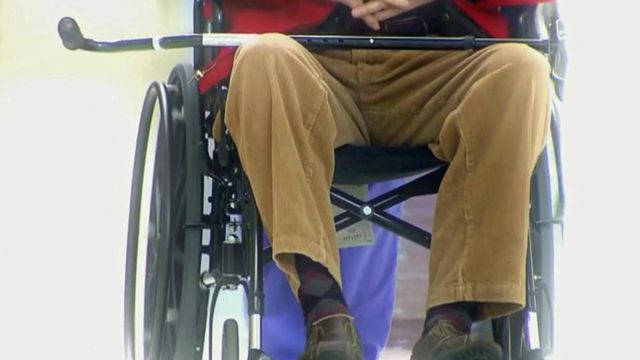VA 'has failed miserably' at handling vets' disability claims
When veterans put down their arms and leave the service, they can apply for disability compensation for injuries sustained while in uniform. But the application and appeals process for compensation is so complicated and cumbersome that many veterans wait years before finally getting an answer, much less any money. According to Veteran's Administration data, more than 30,000 veterans have died since 2009 while waiting for a decision on their cases.
Posted — UpdatedWhen veterans put down their arms and leave the service, they can apply for disability compensation for injuries sustained while in uniform.
But the application and appeals process for compensation is so complicated and cumbersome that many veterans wait years before finally getting an answer, much less any money.
According to Department of Veterans Affairs data, more than 30,000 veterans have died since 2009 while waiting for a decision on their cases.
Andrew Stead, an 18-year Army veteran who served two tours in Afghanistan, knows the pain of waiting. Even after retiring, he's still fighting to get health care through the VA.
He's now in a battle over disability compensation.
"To jump out of airplanes is not a natural thing, and it's something to be very proud of," Stead said. "But now, having dealt with the issues I've had from doing it."
Stead's referring to his ongoing recovery from recent neck surgery and near constant back and leg pain.
After feeling like he was pushed out of the military because of his weight, Stead applied for disability compensation. Stead had previously been diagnosed with a traumatic brain injury and post-traumatic stress disorder (PTSD), but despite that, the VA doctor overseeing his claim ruled differently.
"She says, 'Oh, you may have had some brain injuries, but you don't have a bad traumatic brain injury,'" Stead said. "And that's why I got a 10 percent rating."
Stead is appealing that ruling, but he's finding out that the appeals process is both complicated and long.
Data reviewed by WRAL Investigates shows the average appeal takes 1,029 days. At the end of the 2015-16 fiscal year, there were 81,000 appeals awaiting a ruling from the VA board.
The VA has 120 days to make an initial ruling on a disability claim, and with a backlog of some 70,000 cases, many initial claims are denied or partially granted just to meet the 120-day deadline. As the VA makes headway on the speed of initial rulings, it's creating a paperwork logjam in the appeals process.
Attorney David Russotto, who specializes in VA disability compensation appeals, says the system is set up to fail.
"The road to hell is paved with good intentions. They were the best intentions when this system was designed," he said. "With the manpower available, the number of veterans in the system, the complexity of the disabilities, it's almost impossible for these claims to be resolved in a timely manner once they're denied."
Similar to the health care issues that have plagued the VA for years, the disability appeals process is slow and outdated. Paper appeals are the norm as the VA tries to catch up technologically. Even if a veteran wins an appeal, he or she is only provided back pay based on the date of the most recent appeal, not the date of the initial appeal.
"It's just a system that's completely bogged (down), when you're talking about billions of pieces of paper, and we're talking about where we are in the computer generation," Russotto said. "It's just absurd. So the process has failed miserably."
"They're aware that they need to speed it up, but we're not sure when it's going to get done," he said. "In the meantime, I'm going to lose my house because, you know, they're taking their sweet time. We've only been able to scrape by for two and a half years."
Russotto says the process leaves many veterans wondering whether anyone cares about their health.
"I've felt alone so much," Stead said.
"Their injuries are caused by their time in service, they're unable to work because of their time in service, and they're winding up homeless," Russotto said. "That's why we have homeless veterans."
Stead says he isn't giving up on his appeals process.
"It's the hardest thing to ask for help when you've been the guy that other people come to for help. It's hard," he said. "It'd be nice just to be able to live again."
• Credits
Copyright 2024 by Capitol Broadcasting Company. All rights reserved. This material may not be published, broadcast, rewritten or redistributed.






